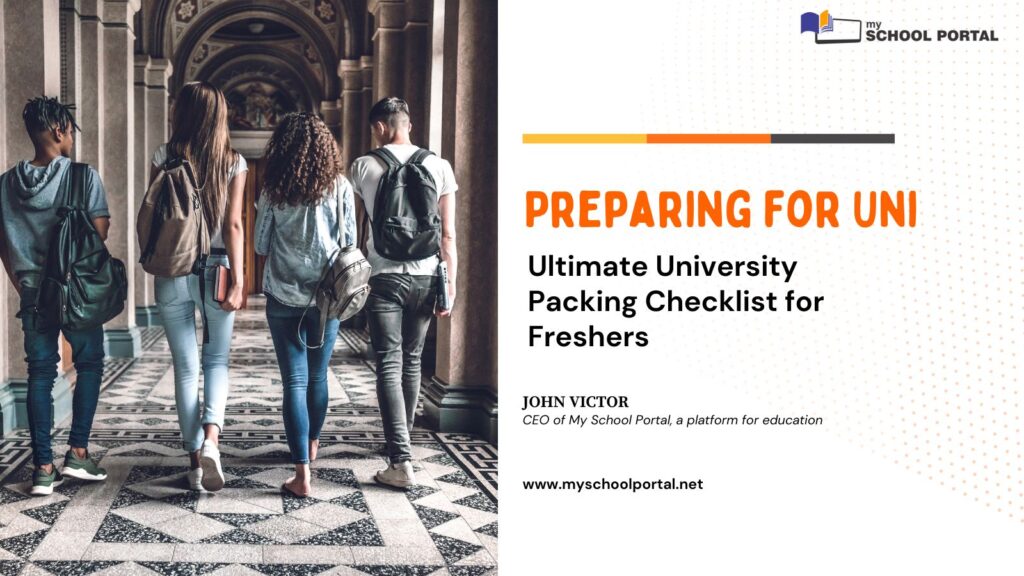If you’re heading to university for the first time, you’re likely busy preparing for your big move. Packing for university can be overwhelming, especially when trying to balance practicality with preparation. To help you out, here’s a comprehensive university packing checklist covering essentials and optional items you might need. This guide will ensure you’re well-prepared and ready to start your university life smoothly.
University Checklist: Important Documents
- Passport (or other ID)
- Driver’s License (if applicable)
- All Official University Correspondence (including acceptance letter)
- Student Loan Correspondence (to track loan payments and follow-ups)
- Accommodation Details and Contract
- Bank Account Details and recent bank correspondence
- Bank Card
- National Insurance Card/Details
- Student Discount Cards (e.g., 16-25 Railcard, NUS card)
- Insurance Documents (for international students who may need health insurance)
Tip: Keep these documents in a secure place or wallet to easily access them when needed.
University Checklist: Electricals
- Laptop or Desktop Computer
- Mobile Phone and Charger
- Extension Cables (handy for various devices)
- USB Memory Stick (for backing up important assignments)
- Desktop Printer (with ink and paper)
- iPod or MP3 Player
- Headphones
- Games Console (optional, for leisure)
- Small TV (optional)
- Camera
- Speakers
Tip: Bring only what you will use regularly. Most universities offer printing services, and it’s best to avoid overloading your space with electronics.
University Checklist: Stationery
- Pens and Pencils
- A4 Lined Notepads
- A4 Binders
- Highlighters
- Post-it Notes
- Calendar/Diary
- Paper Clips
- Stapler
- Sticky Tape
- Course Readers and Study Books
Tip: Opt for affordable stationery as you’ll use these items frequently.
University Checklist: Kitchenware
- Cutlery (spoons, knives, forks)
- Crockery (plates, bowls, mugs)
- Utensils (chopping board, sharp knife, spatula, cheese grater, etc.)
- Saucepan and Frying Pan
- Scissors
- Baking Tray
- Oven Gloves
- Tupperware Containers
- Washing Up Liquid and Sponge
- Recipe Book
- Snacks
Tip: Shared accommodations often come with basic kitchenware, so check with your university’s residential services.
University Checklist: Bedroom
- Mattress Protector
- Duvet and Pillows (choose a higher tog for winter)
- Duvet Cover and Pillow Cases
- Blankets
- Laundry Bin (a large plastic bag works too)
- Clothes Hangers
- Alarm Clock
- Desk Lamp
- Ear Plugs
Tip: Most university accommodations provide standard bedding, but confirm this with your university before buying.
University Checklist: Clothing
- Casual Clothes (t-shirts, jumpers, trousers)
- Underwear (pants, socks, bras)
- Dressing Gown and Slippers
- Winter Coat and Jacket
- Gloves, Hat, and Scarf
- Shoes (trainers, smart shoes, casual)
- Smart Office Outfit (for interviews)
- Sportswear/Swimwear
- Fancy Dress
Tip: Pack versatile clothing suitable for various activities and weather conditions.
University Checklist: Bathroom
- Toothbrush and Toothpaste
- Wash Bag (useful for shared bathrooms)
- Soap
- Shampoo and Conditioner
- Shower Gel
- Deodorant
- Razor/Shaving Foam
- Towels (x2)
- Hand Towel
- Wash Cloth
- Hair Brush
- Toilet Roll
- Tampons/Sanitary Towels
Tip: Ensure you have all personal hygiene items as university bathrooms can be a shared space.
University Checklist: Healthcare
- Personal Medications and Prescriptions
- Basic First Aid Kit (pain relief, plasters, cold and flu medication)
- Details of Current GP and Surgery
- Glasses and Prescription
- Multivitamins
- Birth Control Pills and/or Condoms
Tip: Register with a local doctor’s surgery early to avoid delays when you need medical attention.
University Checklist: Miscellaneous
- Sturdy Bag (for books)
- Photographs of Friends and Family
- Small Sewing Kit
- Matches or Lighter
- Books for Personal Reading
- Films/TV Series Boxsets
- Board/Card Games (e.g., Monopoly)
- Hair Dryer/Hair Straighteners
- Bike (with helmet and lock)
Tip: Consider packing light initially and buying additional items once you’re settled in to avoid unnecessary expenses.
Pro Tip: If you’re unsure about what to take, start with essentials and purchase additional items as needed after you’ve settled into your new environment. This approach prevents overpacking and helps ensure you only bring what you’ll truly use
Related
Stay updated with the latest student resources and insights from My School Portal! Subscribe to our newsletter for fresh content delivered straight to your inbox—no spam, just value 😊














